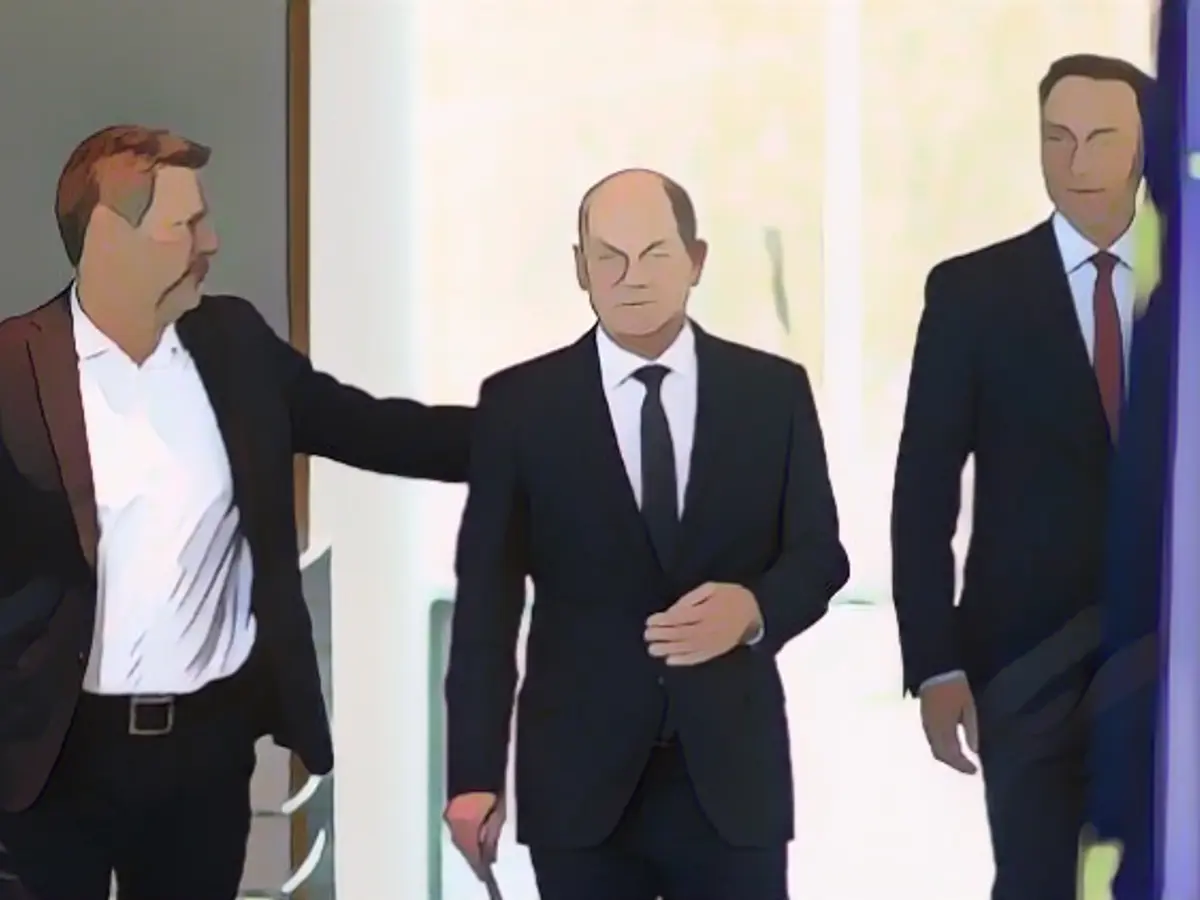Traffic light values stable, but the chancellor slips
For a long time, the traffic light government has failed to provide the Germans with a plan B for the budget crisis. However, the government is largely able to maintain its poll ratings at the previous week's poor level. However, Olaf Scholz is unable to do so on the issue of the chancellor.
Ten days ago, the Federal Constitutional Court turned the federal budget upside down with its decision on special funds and the financing strategy of the traffic light government. Days pass while the population waits for a Plan B to be announced. And it is still not clear how the government intends to finance the 2024 budget. But those who have stuck by the coalition through all the quarrels so far are continuing to do so: the Greens are making up for the point that the SPD has lost in support, while the FDP is stable at a precarious five percent. Broad support looks different, but so does a poll disaster.
Chancellor Olaf Scholz has to digest the fact that his party has once again slipped behind the Greens and is now only the fourth strongest party in the eyes of voters. The AfD is holding on behind the CDU/CSU, which remains stable at the top, but is also not benefiting from the fact that it has put the government in such a difficult position with its appeal to the Federal Constitutional Court. After a brief dip last week, the Left Party is on a slight upward trend again.
If the Bundestag were elected this week, the parties could expect the following result: CDU/CSU 30 percent (Bundestag election in September 2021: 24.1 percent), AfD 21 percent (10.3 percent), SPD 14 percent (25.7 percent), Greens 15 percent (14.8 percent), FDP 5 percent (11.5 percent), Left 4 percent (4.9 percent). The Free Voters fell below the 3% mark again, bringing the figure for other parties up to 11%. At 25%, the proportion of non-voters and undecided voters is higher than the proportion of non-voters in the last federal election (23.4%).
If the budget disaster has hardly had any effect on this week's traffic light balance, voters are evidently more aware that the Federal Chancellor in particular has been slow to come up with a crisis strategy. In terms of chancellor preference, Olaf Scholz lost two or three percentage points compared to the previous week. CDU leader Friedrich Merz, who overtook the chancellor with his approval ratings in October, was able to further extend his lead.
If they could directly elect the Federal Chancellor, 17% would currently opt for Scholz, 21% for Merz and 19% for the Green Minister for Economic Affairs Robert Habeck in the Scholz - Merz - Habeck constellation. This would mean that the incumbent would lose 2 points, while his opponents would each gain one percentage point.
In the Scholz - Merz - Baerbock constellation, Scholz would receive 19%, Merz 25% and Baerbock 17%. This means that the Chancellor would lose more, while Merz and Foreign Minister Annalena Baerbock would both gain one percentage point. The CDU leader's current role as favorite becomes clearer in this constellation.
In terms of political competence, the SPD and CDU/CSU lose a little confidence, while the Greens and FDP gain a little. The SPD deteriorated from 8 to 7 percent, while 15 percent trust the CDU/CSU to deal with the problems in Germany, compared to 16 percent in the previous week. The FDP's assessment of its political competence increased from 1% to 2%, while the AfD lost one percentage point to 7%. Overall, the major parties are viewed more critically in terms of their abilities: While the average score for those who do not consider any party to be politically competent was still at 56% in October, it rises to 59% this week.
In this week's issue radar, interest in the wars in the Middle East and Ukraine continues to wane. 52% consider the conflict in the Middle East to be the most important topic, compared to 68% at the end of October. For 31%, the war in Ukraine is the most relevant issue, compared to 36% at the end of October. However, the budget crisis is now in third place among the most important issues, at 27%. This is followed by work and the state of the federal government with 22%.
The data for the RTL/ntv trend barometer was collected by the market and opinion research institute Forsa on behalf of RTL Deutschland between November 21 and 27. Data basis: 2500 respondents. Statistical margin of error: plus/minus 2.5 percentage points.
Further information on Forsa here.Forsa surveys on behalf of RTL Germany.
The RTL/ntv trend barometer, conducted by Forsa, showed that the traffic light coalition's poll ratings remain largely stable despite the budget crisis, with the SPD slightly losing support while Alliance 90/The Greens and the FDP maintain their positions. The RTL/ntv trend barometer also revealed that Chancellor Olaf Scholz is losing ground in terms of chancellor preference, with CDU leader Friedrich Merz gaining votes. The surveys indicate that if a Bundestag election were held this week, the CDU/CSU would remain the strongest party, while the Left Party is showing a slight upward trend.
Source: www.ntv.de








